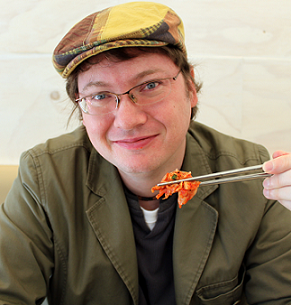한식을 홍보하는 사람들이 아직도 ‘구절판’과
같이 평소 한국인들이 잘 먹지도 않을뿐더러 평범한 미국인이라면 관심도 없을 고급
음식들에만 집착하고 있는 것은 정말 안타까운 일이 아닐 수 없다. 재미있는
것은 그런 한식 홍보 담당자들이, 너무 수준이 낮다는 이유로 꺼리는 서민 음식들이
뉴욕 고급 식당 메뉴 속에 자리를 잡고 유명 음식 평론가들의 호평을 이끌어내고 있다는 점이다.
최근 ‘뉴욕타임즈’의 음식 비평가인
샘 시프턴(Sam Sifton)은 올 여름 문을 연 이래 큰 인기를 끌고 있는 ‘단지(Danji)’라는
이름의 한국 식당을 소개했다. 이 까다롭기로 유명한 비평가가 칭찬을 쏟아
낸 메뉴들은 우리가 근처 식당에서 흔히 점심으로 먹는 바로 그런 음식들이었다.
기사에서 묘사된 음식들은 모두 고상하고 이국적인 느낌이 물씬 풍겼지만 사실은
화려한 단어들로 치장된 일상적인 한국 음식들이었다. 무려 한 문단에 걸쳐 소개된
‘매운 쇠고둥 샐러드’와 ‘메밀가루로 만든 국수’는 다름 아닌 ‘골뱅이 무침’과 ‘쫄면’이었고,
샘 시프턴이 한 입 먹고난 뒤 ‘감칠맛의 표본’이라고 극찬한 ‘무를 곁들인 데친 은대구
요리’는 바로 ‘은대구조림’이었다.
기사 중 가장 반가웠던 부분은 그 식당에서는
‘매운 비무장지대(DMZ) 찌개’라는 아주 특별한 이름으로 불리고 있는 부대찌개에
대해 샘 시프턴이 긍정적인 평가를 주었다는 점이다. 사실 몇 년 전 한 한식 홍보
담당자가 ‘론리 플래닛(Lonely Planet; 세계에서 가장 영향력 있는 세계 여행 소개서)’
서울편에서 부대찌개를 없애려고 애쓰다가 결국 실패한 것을 본 적이 있다. 자신의
‘양반 기준’에 못 미친다는 전형적인 편견을 가진 사람이었다.
한식을 홍보하는 사람들이 인기를 끌
음식과 그렇지 않을 음식을 미리 자신들의 기준에 맞추려고 노력하는 만큼, 평범한
미국인들은 평범한 한국인들이 좋아하고 자주 먹는 음식들을 좋아할 가능성이
크다는 사실을 반드시 염두에 둬야 할 것이다. 음식은 맛있으면 그것으로 충분한 것이다.
나를 포함한 많은 외국인들이 실제로 부대찌개를 좋아한다. 부대찌개는 20세기 최초의
동서양 퓨전 음식 중 하나가 아닌가! 위대한 역사를 가진 아주 흥미로운 음식인 것이다.
한식 홍보 담당자들은 음식의 수준이
높고 낮음에 너무 집착하는 바람에 ‘음식은 즐기는 것’이라는 가장 간단한 사실을 쉽게
간과하곤 한다. 음식은 누군가의 지위가 높고 낮음을 증명해주는 무기나 도구가
아니다. 이런 생각을 가진 사람들은 한식 홍보 캠페인에서 빠지는 것이 모두에게
이롭다. 그런 사람들은 음식이 무엇인지, 시장이 어디인지를 이해하지 못 할 뿐만 아니라 자신들의 고유한 문화도 이해하지 못 하고 있는 것이기 때문이다.
한국에서 인기 있는 외국 음식들을
생각해보자. 그 음식들 역시 자국에서 최고급으로 평가 받는 값비싼 요리들이 아니라
스파게티, 쌀국수, 타코, 타파스, 탄두리 치킨 등과 같이 그 나라 사람들이 매일
먹는 평범한 음식들이다. 그런데도 한식을 홍보하는 사람들은 왜 여전히 부자들이,
그것도 특별한 날에만 먹는 그런 음식들만을 홍보하려고 애쓰는 걸까?
(원문)
Some Love for Budae Jjigae
It’s frustrating that Korean food
promoters are still fixated on promoting high end dishes, like 구절판, which
everyday Koreans don’t eat and everyday Americans aren’t interested in. What
I find amusing is that the dishes that the food promoters shun as too low class
are finding their ways onto high end New York menus and the praise of some significant
food writers.
Sam Sifton, the food critic for The
New York Times, recently reviewed Danji, a Korean gastropub that has been exciting
restaurant goers since its opening this summer. This sophisticated food critic
gushed over dishes that we usually eat for lunch at the local 식당. He described
dishes that sounded ethereal and exotic on paper. Then I figured out they were
everyday Korean dishes dressed up with fancy words. “Spicy whelk salad” and
the “buckwheat noodles” he dedicated a paragraph to were basically 골뱅이무침
and 쭐면. “Poached sablefish with daikon,” which Sifton praised as “the concept
of umami” in a single bite, is just 은대구조림.
My most gleeful surprise was that
he gave a positive nod towards the restaurant’s version of 부대찌개, which
the restaurant calls “Spicy ‘DMZ’ Meat Stew.” I was in a meeting a few years
ago when an official was trying in vain to remove the mention of 부대찌개 from
the Lonely Planet guide to Seoul. She referred to it as an embarrassment. That
was code that it wasn’t high class enough for her yangban standards.
As much as Korean food promoters
try to control what gets popular and what doesn’t, they will have to figure
out that everyday Americans will likely enjoy the same things everyday Koreans
enjoy. If it’s good, it’s good. I love 부대찌개. So do many other foreigners.
It was one of the first Western-Asian fusion dishes of the 20th century. It
has great history behind it. And it’s a fun dish.
Korean food promoters are so obsessed
with class status that they ignore that food is to be enjoyed. It’s not a weapon
or a tool to prove someone’s class status. People who believe that should not
be allowed near any Korean food promotional campaign. They don’t understand
food. They don’t understand their market. They don’t understand their own
culture.
Think about the foreign foods that
are popular in Korea. They aren’t the super gourmet expensive dishes from their
home countries. They’re everyday dishes that everyday people love: spaghetti,
pho, tacos, tapas, tandoori chicken. So why do Korean food promoters still stubbornly
insist on only promoting the Korean dishes that only rich people eat on special
occasions?
조 맥퍼슨(Joe
McPherson)은?
조 맥퍼슨(Joe McPherson)은 한국음식을 주제로 한 영문 블로그
‘젠김치(www,zenkimchi.com)’을 운영 중인 외국인 블로거다. 미국인으로 지난해 10월 한국인 아내와 결혼했으며, 곱창과
돼지껍데기를 즐긴다. 2004년부터 운영하기 시작한 ‘젠김치’는 하루 최고 1만8000번의 페이지뷰를 기록하는 파워블로그. 미국, 호주 등
영어권 국가뿐 아니라 프랑스, 독일, 심지어 아프리카 국가에서도 이 블로그를 찾고 있다.
 이 누리집은 대한민국 공식 전자정부 누리집입니다.
이 누리집은 대한민국 공식 전자정부 누리집입니다.



